- Home
- Linwood Barclay
The Accident
The Accident Read online
BY LINWOOD BARCLAY
Bad Move
Bad Guys
Lone Wolf
Stone Rain
No Time for Goodbye
Too Close to Home
Fear the Worst
Never Look Away
The Accident
Copyright © 2011 Linwood Barclay
All rights reserved. The use of any part of this publication, reproduced, transmitted in any form or by any means electronic, mechanical, photocopying, recording or otherwise, or stored in a retrieval system without the prior written consent of the publisher—or in the case of photocopying or other reprographic copying, license from the Canadian Copyright Licensing agency—is an infringement of the copyright law.
Doubleday Canada and colophon are registered trademarks.
Library and Archives of Canada Cataloguing in Publication is available upon request.
eISBN: 978-0-385-67059-3
The Accident is a work of fiction. Names, characters, places and incidents are products of the author’s imagination or are used fictitiously. Any resemblance to actual events or locales or persons, living or dead, is entirely coincidental.
Cover design: Carlos Beltran
Cover art © Chris Titze
Cover photograph: Juergen Stein/Getty Images
Published in Canada by Doubleday Canada, a division of Random House of Canada Limited
Visit Random House of Canada Limited’s website: www.randomhouse.ca
v3.1
For Neetha
Contents
Cover
Other Books by This Author
Title Page
Copyright
Dedication
Prologue
Two Months Later
One
Two
Three
Four
Five
Six
Seven
Eight
Nine
Ten
Eleven
Twelve
Thirteen
Fourteen
Fifteen
Sixteen
Seventeen
Eighteen
Nineteen
Twenty
Twenty-one
Twenty-two
Twenty-three
Twenty-four
Twenty-five
Twenty-six
Twenty-seven
Twenty-eight
Twenty-nine
Thirty
Thirty-one
Thirty-two
Thirty-three
Thirty-four
Thirty-five
Thirty-six
Thirty-seven
Thirty-eight
Thirty-nine
Forty
Forty-one
Forty-two
Forty-three
Forty-four
Forty-five
Forty-six
Forty-seven
Forty-eight
Forty-nine
Fifty
Fifty-one
Fifty-two
Fifty-three
Fifty-four
Fifty-five
Fifty-six
Fifty-seven
Fifty-eight
Fifty-nine
Sixty
Sixty-one
Sixty-two
Sixty-three
Three Weeks Later
Epilogue
Acknowledgments
About the Author
PROLOGUE
Their names were Edna Bauder and Pam Steigerwald, and they were grade school teachers from Butler, Pennsylvania, and they had never been to New York before in their entire lives. New York was hardly the other side of the planet, but when you lived in Butler, almost everything seemed that way. As Pam’s fortieth birthday approached, her friend Edna said you’re going to have a birthday weekend you are never, ever going to forget, and on that count she turned out to be absolutely right.
Their husbands were delighted when they heard this was a “girls only” weekend. When they learned it was going to be two full days of shopping, a Broadway show, and going on the Sex and the City tour, they said they would rather stay home and blow their brains out. So they put their wives on the bus and said have fun and try not to get too drunk because there’s a lot of muggers in New York, everybody knows that, and you have to keep your wits about you.
They found a hotel near Fiftieth and Third that was, at least by New York standards, reasonable, although it still seemed like a lot considering all they were going to do was sleep there. They’d vowed to save money by not taking cabs, but the maps of the subway system looked like a schematic for the space shuttle, so they decided, what the hell. They went to Bloomingdale’s and Macy’s and a huge shoe outlet in Union Square that would have held every store in Butler and still had room left over for the post office.
“I want my ashes scattered through this place when I die,” Edna said, trying on a pair of sandals.
They tried to get to the top of the Empire State Building, but the line to get in was huge, and when you had only forty-eight hours in the Big Apple you didn’t want to spend three of them waiting in line, so they bailed.
Pam wanted to eat lunch at that deli, the one from that movie where Meg Ryan had the fake orgasm. Their table was right next to the one they used in the movie—there was even a sign hanging over it to mark the spot—but when they got back to Butler they’d tell everyone they got the actual table. Edna ordered a pastrami sandwich with a knish, even though she had no idea what a knish was. Pam said, “I’ll have what she’s having!” and the two of them went into fits of hysterics when the waitress rolled her eyes.
While having coffee afterward, Edna said, almost out of nowhere, “I think Phil’s been seeing that waitress at Denny’s.” And then she burst into tears, and Pam asked why she suspected such a thing, that she thought Edna’s husband, Phil, was a good guy who’d never cheat, and Edna said she didn’t think he was actually sleeping with her or anything, but he went there for coffee every single day, so that had to mean something. And the thing was, he hardly ever touched her anymore.
“Come on,” Pam said. “We’re all busy, we got kids, Phil’s working two jobs, who’s got the energy?”
“Maybe you’re right,” Edna said.
Pam said, “You need to get your mind off that nonsense. You brought me here to have fun.” She opened her New York Fodor’s tourist guidebook to the spot where she’d put a sticky note and said, “You need more retail therapy. We’re going to Canal Street.”
Edna had no idea what that was. Pam said you could buy purses—designer purses, or at least purses that looked just like designer purses—for next to nothing down there. You have to ask around for the best deals, she said. She’d read in a magazine somewhere that sometimes the best stuff, it’s not even out where the people can see it. You have to go into a back room or something.
“You’re talkin’ my language, honey,” Edna said.
So they grabbed yet another cab and asked to be taken to the corner of Canal and Broadway, but at Lafayette and Grand the taxi came to a dead stop.
“What’s happened?” Edna asked the driver.
“Accident,” he said in an accent Pam thought could be anything from Salvadoran to Swiss. “I can’t turn around. Is just few blocks that way.”
Pam paid the driver and they started walking in the direction of Canal. A block up, a crowd had gathered. Edna said, “Oh my God.”
She looked away, but Pam was transfixed. A man’s legs were splayed across the hood of a yellow cab that had crashed into a streetlight. His upper body had gone through the windshield and was draped over the dashboard. A mangled bicycle was trapped under the car’s front wheels. There was no one behind the wheel. Maybe the dri
ver had already been taken to the hospital. People with FDNY and NYPD on their backs were inspecting the car, telling the crowd to move back.
Someone said, “Fucking bike messengers. Amazing it doesn’t happen more often.”
Edna took Pam by the elbow. “I can’t look at this.”
By the time they found their way to Canal and Broadway, they hadn’t exactly put that horrible image out of their heads, but they’d been repeating a “These things happen” mantra that would allow them to still make the most they could out of this weekend.
Pam used her camera phone to get a shot of Edna standing under the Broadway street sign, and then Edna got a shot of Pam doing the same. A man walking past offered to take pictures of the two of them together, but Edna said no thank you, telling Pam later it was probably just a ploy to steal their phones. “I wasn’t born yesterday,” Edna said.
As they moved east on Canal the two of them felt as though they’d wandered into a foreign country. Weren’t these what the markets in Hong Kong or Morocco or Thailand looked like? Stores jammed together, merchandise spilling out onto the street?
“Not exactly Sears,” Pam said.
“So many Chinese people,” Edna said.
“I think that’s ’cause it’s Chinatown,” Pam said.
A homeless man wearing a Toronto Maple Leafs jersey asked for change. Another tried to hand them a flyer but Pam held up her hand defensively. Throngs of teenage girls giggled and gawked, some able to carry on conversations while music chattered from the buds stuffed into their ears.
The store windows were jammed with necklaces, watches, sunglasses. A WE BUY GOLD sign was positioned out front of one. A long, vertical sign hanging off a fire escape read “Tattoo—Body Piercing—Henna Temporary Supplies—Wholesale Body Jewelry—Books Magazines Art Objects 2nd Floor.” There were signs pushing “Leather” and “Pashmina” and countless banners in Chinese characters. And even a Burger King.
The two women went into what they thought was one store, but it turned out to be dozens. Like a mini-mall, or a flea market, with each business ensconced in its own glass-walled cubicle. They all offered a specialty. Stalls for jewelry, DVDs, watches, purses.
“Look at this,” Edna said. “A Rolex.”
“It’s not real,” Pam said. “But it looks fabulous. Think anyone in Butler knows the difference?”
“Think anyone in Butler even knows what a Rolex is?” Edna laughed. “Oh, check out the bags!”
Fendi, Coach, Kate Spade, Louis Vuitton, Prada. “I can’t believe these prices,” Pam said. “What would you normally pay for a bag like this?”
“Way, way more,” Edna said.
The Chinese man running the stall asked if they wanted help. Pam, trying to act as though she knew the territory, which was not easy when you had a New York guidebook sticking halfway out of your purse, asked, “Where do you have the real deals?”
“What?” he said.
“These are nice,” she said. “But where do you keep the prime stuff?”
Edna shook her head nervously. “No, these are fine. We can pick from these.”
But Pam persisted. “A friend told me, I’m not sure if it was your place specifically, but there might be some other bags, but not on display here.”
The man shook his head. “Try her,” he said, pointing deeper into the rabbit warren of shops.
Pam went to the next kiosk and, after giving the bags a cursory look, asked the elderly Chinese woman, dressed in a brilliant red silk jacket, where they were hiding the good stuff.
“Huh?” the woman said.
“The best bags,” Pam said. “The best knockoffs.”
The woman gave Pam and Edna a long look, thinking that if these two were undercover cops, they were the best she’d ever seen. Finally, she said, “You go out the back door, go left, look for door with number eight on it. Go down there. Andy’ll help you.”
Pam glanced excitedly at Edna. “Thank you!” she said, and grabbed hold of Edna’s arm, tugging her to a door at the end of the narrow mall.
“I don’t like this,” Edna said.
“Don’t worry, it’s okay.”
But even Pam was caught up short when they went through the door and found themselves in an alley. Dumpsters, trash strewn everywhere, abandoned appliances. The door closed behind them and when Edna grabbed it she found it locked.
“Great,” she said. “Like that accident didn’t freak me out enough.”
“She said go left, so let’s go left,” Pam said.
They didn’t have to walk far before they found the metal door with an “8” painted on it. “Do we knock or just go in?” Pam asked.
“This is your brilliant idea, not mine,” Edna said.
Pam rapped lightly, and when no one came after ten seconds, she pulled on the handle. The door was unlocked. They were met with a short set of steps leading down a dark stairwell. But there was a glimmer of light at the bottom.
“Hello? Andy?” Pam called out.
There was no answer.
“Let’s go,” Edna said. “I saw some purses at the other place that were perfect.”
“We’re already here,” Pam said. “Might as well check it out.” She went down the stairs, feeling the temperature drop with each step. She peered into a room at the bottom, then turned and looked back up at Edna with a huge grin on her face. “This is so the place.”
Edna followed her into a dense, cluttered, low-ceilinged room that was jammed with handbags. They were on tabletops, hanging from hooks on the walls, hanging from hooks in the ceiling. Maybe because it was cold, it reminded Edna of a meat locker, but instead of sides of beef dangling from above, it was leather goods.
“I must be dead,” Pam said. “We’re in Purse Heaven.”
Tubular fluorescent lights flickered and buzzed above their heads as they began picking through bags on the display tables.
“If this is a fake Fendi, I’ll eat Phil’s hat,” Edna said, inspecting one bag. “The leather feels so real. I mean, it is real leather, right? It’s just the labels that are fake? I’d love to know how much this one is.”
Pam noticed a curtained door at one end of the room. “Maybe that Andy guy is in there.” She started walking toward it.
Edna said, “Wait. We should get out of here. Look at us. We’re in some basement, off an alley, in New York City, and no one has any idea whatsoever where we are.”
Pam rolled her eyes. “God, you’re so Pennsylvania.” She reached the doorway and called out, “Mr. Andy? The Chinese lady said you could help us?” As soon as she’d said “Chinese lady,” she felt like an idiot. That really narrowed it down.
Edna had gone back to examining the lining of the fake Fendi.
Pam reached out and pulled aside the curtain.
Edna heard a funny sound, a kind of pfft, and by the time she’d looked over, her friend was on the floor. Not moving.
“Pam?” She dropped the purse. “Pam, are you okay?”
As she approached she noticed that Pam, who was on her back, had a red dot on the middle of her forehead and something was running out of it. Like Pam had sprung a leak.
“Oh my God, Pam?”
The curtain opened and a tall, thin man, with dark hair and a scar over his eye, stepped out. He had a gun, and it was pointed straight at her head.
In her last remaining second, Edna spotted, just inside the room beyond the curtain, an elderly Chinese man, seated at a desk, his forehead resting on it, a rivulet of blood draining from his temple.
The last thing Edna heard was a woman—not Pam, because Pam was done talking—saying, “We have to get out of here.”
The last thing Edna thought was, Home. I want to go home.
ONE
If I’d known this was our last morning, I’d have rolled over in bed and held her. But of course, if it had been possible to know something like that—if I could have somehow seen into the future—I wouldn’t have let go. And then things would have been different.
“How’d you sleep?” Sheila asked as I rubbed my eyes. She reached out and touched my back.
“Not so good. You?”
“Off and on.”
“I sensed you were awake, but I didn’t want to bug you, on the off chance you were sleeping,” I said, glancing over my shoulder. The sun’s first rays of the day filtered through the drapes and played across my wife’s face as she lay in bed, looking at me. This wasn’t a time of day when people looked their best, but there was something about Sheila. She was always beautiful. Even when she looked worried, which was how she looked now.
I turned back around, looked down at my bare feet. “I couldn’t get to sleep for the longest time, then I think I finally nodded off around two, but then I looked at the clock and it was five. Been awake since then.”
“Glen, it’s going to be okay,” Sheila said. She moved her hand across my back, soothing me.
“Yeah, well, I’m glad you think so.”
“Things’ll pick up. Everything goes in cycles. Recessions don’t last forever.”
I sighed. “This one sure seems to. After these jobs I’m doing now, we got nothin’ lined up. Some nibbles, did a couple of estimates last week—one for a kitchen, one to finish off a basement—but they haven’t called back.”
I stood up, turned and said, “What’s your excuse for staring at the ceiling all night?”
“Worried about you. And … I’ve got things on my mind, too.”
“What?”
“Nothing,” she said quickly. “I mean, just the usual. This course I’m taking, Kelly, your work.”
“What’s wrong with Kelly?”
“Nothing’s wrong with her. I’m a mother. She’s eight. I worry. It’s what I do. When I’ve done the course, I can help you more. That’ll make a difference.”
“When you made the decision to take it, we had the business to justify it. Now, I don’t know if I’ll even have any work for you to do,” I said. “I just hope I have enough to keep Sally busy.”

 Chase
Chase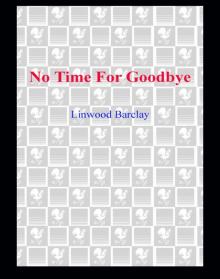 No Time for Goodbye
No Time for Goodbye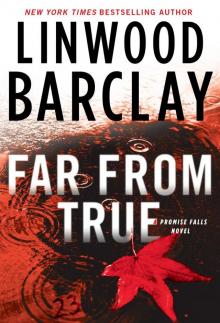 Far From True
Far From True Lone Wolf
Lone Wolf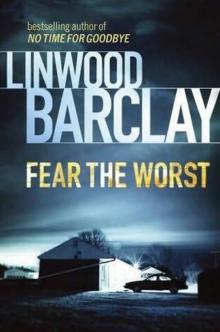 Fear the Worst
Fear the Worst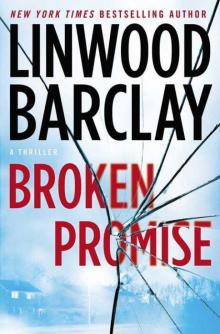 Broken Promise
Broken Promise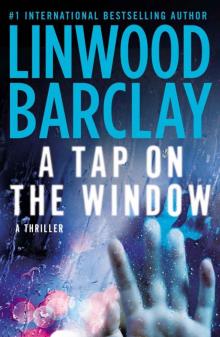 A Tap on the Window
A Tap on the Window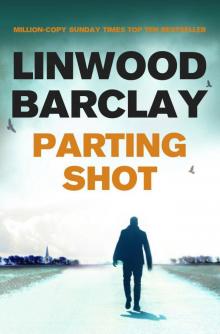 Parting Shot
Parting Shot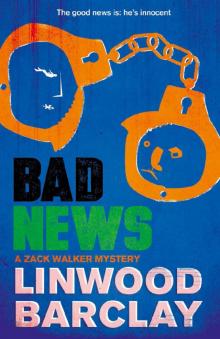 Bad News
Bad News Too Close to Home
Too Close to Home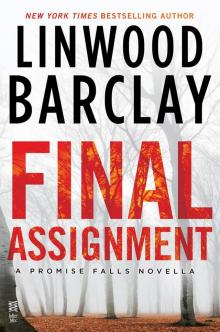 Final Assignment
Final Assignment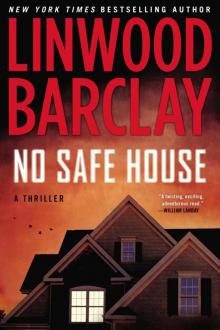 No Safe House
No Safe House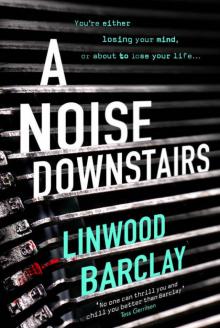 A Noise Downstairs
A Noise Downstairs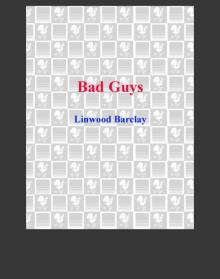 Bad Guys
Bad Guys The Accident
The Accident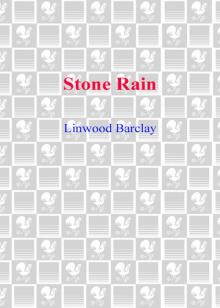 Stone Rain
Stone Rain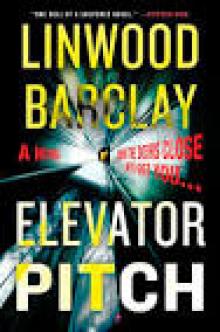 Elevator Pitch
Elevator Pitch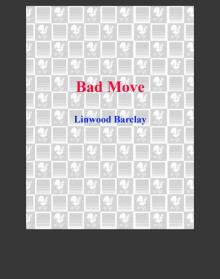 Bad Move
Bad Move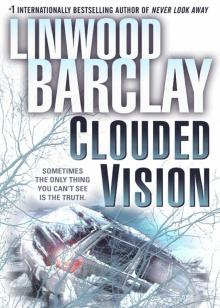 Clouded Vision
Clouded Vision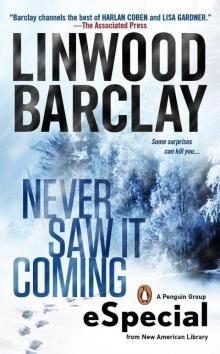 Never Saw It Coming
Never Saw It Coming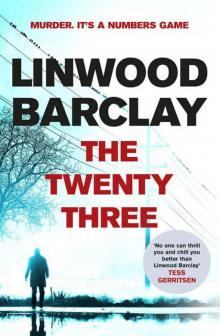 The Twenty-Three
The Twenty-Three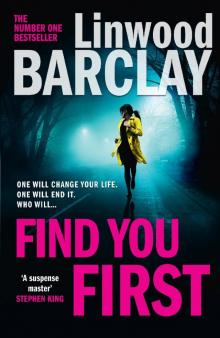 Find You First
Find You First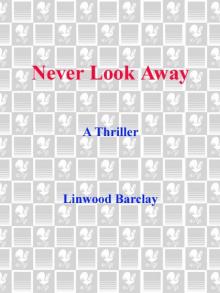 Never Look Away
Never Look Away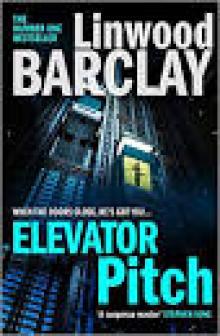 Elevator Pitch (UK)
Elevator Pitch (UK)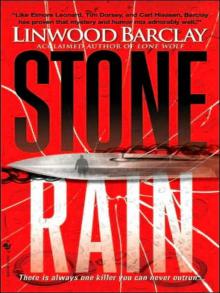 Stone Rain zw-4
Stone Rain zw-4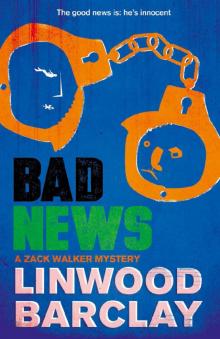 Bad News: A Zack Walker Mystery #4
Bad News: A Zack Walker Mystery #4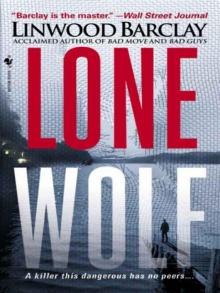 Lone Wolf zw-3
Lone Wolf zw-3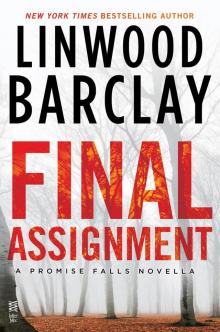 Final Assignment: A Promise Falls Novella
Final Assignment: A Promise Falls Novella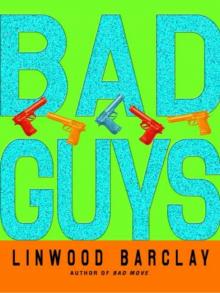 Bad Guys zw-2
Bad Guys zw-2 Never Saw It Coming: (An eSpecial from New American Library)
Never Saw It Coming: (An eSpecial from New American Library)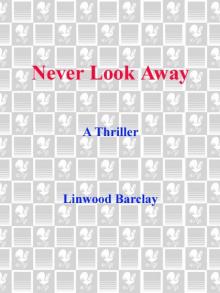 Never Look Away: A Thriller
Never Look Away: A Thriller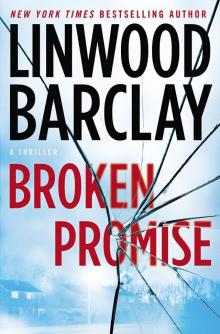 Broken Promise: A Thriller
Broken Promise: A Thriller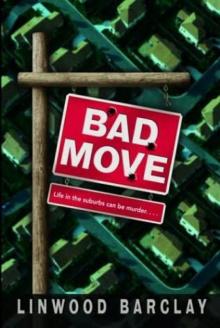 Bad Move zw-1
Bad Move zw-1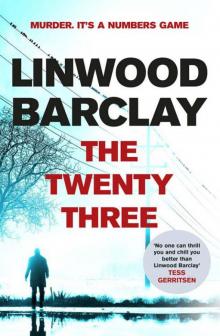 The Twenty-Three 3 (Promise Falls)
The Twenty-Three 3 (Promise Falls)